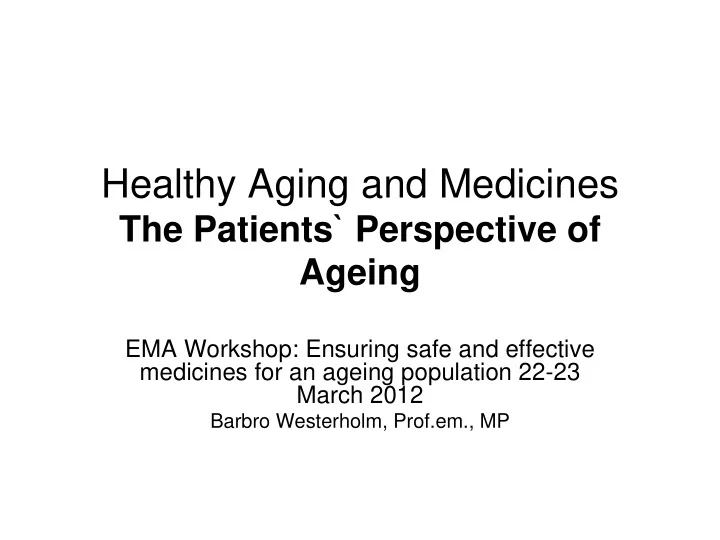

Healthy Aging and Medicines The Patients` Perspective of Ageing EMA Workshop: Ensuring safe and effective medicines for an ageing population 22-23 March 2012 Barbro Westerholm, Prof.em., MP
”We are born as copies and die as originals” Bo G. Eriksson in his theses Studying ageing: experiences, description, variation, prediction and explanation. Gothenburg 2010
During the last century we have added a quarter of a century to our lives And! We continue to increase our life expectancy
Demografic profile today and in the future From the shape of a pyramide -a skyscraper - a muffins We, the older people are on the top floor. Some are healthy and fit, some have health problems of varying severity, some are very, very ill
We, the older people, are individuals • We do not want to meet ageism • We do not want to be discriminated • We want to keep our self-determination • We want to keep our dignity, integrity • We want to feel we are a resource • When in need, we want access to high quality care and services including palliative care • At the very end of life we should not feel medical interventions as assaults
We, the older people, are young people who have lived for a while Here some facts to take into account
Healthy life years and life expectancy at birth by gender 2008, WHO European Region • Men: 66 – 80 years but • 8 – 22 years in ill health • Women: 77 – 87 years but 10 – 27 years in ill health
Need of health care Older people • The period of need of reconstruction of hips, cardiac vessels, eye lenses etc. • The fragile period – co-morbidities, complex needs
Older people in most need of care Swedish data 2010 • Dementia 9 percent of the 65+ , half of them live in care/nursing homes • Older people with co-morbidities, 18 percent of the 65+ in Sweden Defined as those with three or more diagnoses during the last 12 months, 19 days in hospitals, or three or more stays in hospital or more than seven visits to specialized physicians in out patient care.
Burden of disease There is a burden of disease that we have to reduce by • Health promotion • Rehabilitation • Rational use of medicines
Which are the problems? • Symptoms differ in older persons - early dementia can be described as stomach problems - vertigo may be caused by antihypertensive medicines but thought to be due to problems in the inner ear. Older people are too often treated for their symptoms, proper diagnostics are not carried out
Which are the problems? Polypharmacy • Percentage of 80+ with ten or more medicines • All 12.2 % • Women 13.2 % Men 10.3 % • With Apodos (dosage aid) • All 27.2 % Swedish Prescription Survey 2010
Medicines contraindicated for use by older patients Situation 80+ • Women 13.1 % of all prescriptions • Men 10.1 % of all prescriptions Swedish Prescription Survey 2010
Pharmacovigilance Reports, WHO drug monitoring centre 2010 • Top five medicines reported from 26 EU member states, men women 80 + • Acetysalicylic acid • Warfarin • Levofloxacin • Furosemide • Acenocoumarol
What do we patients/consumers want • Health care personnel educated in geriatrics, gerontology and drug treatment • One physician responsible for the coordination of treatment • And very important to get answers to the following questions:
Questions to be answered • Why am I prescribed this medicine? • Are there other ways to treat my health problem? • Which are the effects of my new medicine? • Which are the adverse reactions? And how can I avoid them? • Can I take my new medicines together with the other medicines I am prescribed? • Can I take it together with the herbal medicines I use? • Can I get a test package first? • Is this medicine tested in older patients?
Thank you for your attention And now questions
Recommend
More recommend